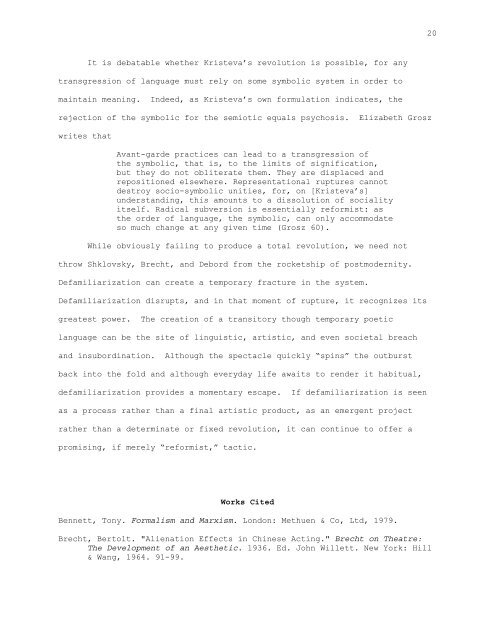Defamiliarization - Audrey Watters
Defamiliarization - Audrey Watters
Defamiliarization - Audrey Watters
You also want an ePaper? Increase the reach of your titles
YUMPU automatically turns print PDFs into web optimized ePapers that Google loves.
It is debatable whether Kristeva’s revolution is possible, for any<br />
transgression of language must rely on some symbolic system in order to<br />
maintain meaning. Indeed, as Kristeva’s own formulation indicates, the<br />
rejection of the symbolic for the semiotic equals psychosis. Elizabeth Grosz<br />
writes that<br />
Avant-garde practices can lead to a transgression of<br />
the symbolic, that is, to the limits of signification,<br />
but they do not obliterate them. They are displaced and<br />
repositioned elsewhere. Representational ruptures cannot<br />
destroy socio-symbolic unities, for, on [Kristeva’s]<br />
understanding, this amounts to a dissolution of sociality<br />
itself. Radical subversion is essentially reformist: as<br />
the order of language, the symbolic, can only accommodate<br />
so much change at any given time (Grosz 60).<br />
While obviously failing to produce a total revolution, we need not<br />
throw Shklovsky, Brecht, and Debord from the rocketship of postmodernity.<br />
<strong>Defamiliarization</strong> can create a temporary fracture in the system.<br />
<strong>Defamiliarization</strong> disrupts, and in that moment of rupture, it recognizes its<br />
greatest power. The creation of a transitory though temporary poetic<br />
language can be the site of linguistic, artistic, and even societal breach<br />
and insubordination. Although the spectacle quickly “spins” the outburst<br />
back into the fold and although everyday life awaits to render it habitual,<br />
defamiliarization provides a momentary escape. If defamiliarization is seen<br />
as a process rather than a final artistic product, as an emergent project<br />
rather than a determinate or fixed revolution, it can continue to offer a<br />
promising, if merely “reformist,” tactic.<br />
Works Cited<br />
Bennett, Tony. Formalism and Marxism. London: Methuen & Co, Ltd, 1979.<br />
Brecht, Bertolt. "Alienation Effects in Chinese Acting." Brecht on Theatre:<br />
The Development of an Aesthetic. 1936. Ed. John Willett. New York: Hill<br />
& Wang, 1964. 91-99.<br />
20


